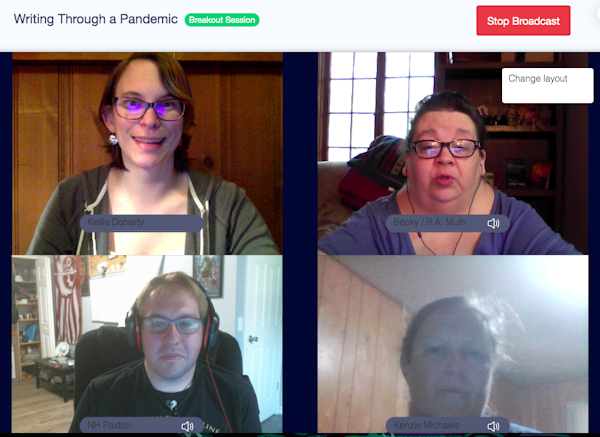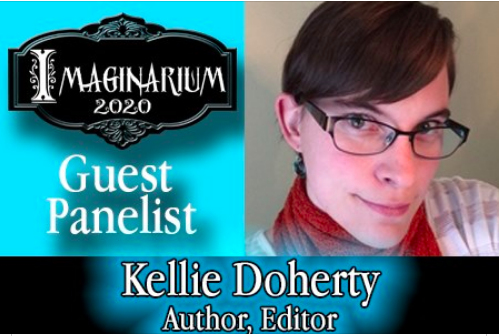As you know, over the summer I attended some amazing virtual literary events—like TorCon2020 and Comic-Con@Home—and I waxed poetic about how amazing those two events were and how great it was that I, a geek who lives in the Land of the Midnight Sun also known as Alaska, could attend these two powerhouses of literary and wonderfully geeky events. Normally these events happen in the Lower 48 which would require a day of flying at least to get to the location, so it was amazing that I could attend from the comfort of my own home. I was quite grateful for the opportunity.

As an author, one key thing I always need to be doing is marketing, and events are wonderful marketing tools. Events allow us authors and other creatives to reach a new audience base, network with fellow creatives, and get our names out there. It allows people to gush about what they love while also opening doors for others who are looking to get into those fields. It even helps to demystify the careers of creatives. Plus, events are great for selling—vendor tables are usually bustling, and panels/workshops are key places to chat about all the creative endeavors.
But what about virtual events? Is it still a great experience for the panelists? Well, I got involved in some pretty fabulous literary events in September—namely an ImageOutWrite reading, the PNWA 2020 Conference, and the Imaginarium Convention. I was thrilled and honored to be a reader and a panelist at these events. Now that they’ve ended, I can take some time to reflect on how it went as a panelist, not an attendee. Time to break out my trusty Pro/Con List!
PROS
No Travel Necessary
Travel is a real thing for those who call Alaska home. It takes forever to get anywhere, even in-state, because Alaska is just that big. Out of state, though? You better plan for a literal whole day of travel; it takes four hours just to get to the Seattle/Portland area. (I know, I lived there for three years!) Like the conferences I got to go to as an attendee, all three of these events I was a reader/panelist for took place in the Lower 48—New York for the ImageOutWrite reading, Washington state for the PNWA Conference, and Kentucky for the Imaginarium Convention. All of these events would have taken place in-person had COVID-19 not upheaved the entire notion, but because they were online it was much easier to be part of them. No travel necessary, save for the set-up downstairs or (to be totally transparent) my bedroom!
Nerves of Technological Steel
Public speaking is nerve-wracking for me; it always has been, especially when I can’t practice beforehand. (That’s my drama background shining through.) Readings aren’t that bad because I can rehearse the reading in front of my family and my cats, but for panels, there’s no way to actually prep! For some crazy reason, I wasn’t as nervous to speak during these events as I normally am.

Wider Network
Having everything done virtually makes it easier to connect with a wider community—statewide, nationwide, and beyond. This is honestly one of the cooler benefits to being part of a virtual conference; the attendees could be from anywhere! This goes hand-in-hand with the “No Travel Necessary” idea because simply being online means anyone with an internet connection can link up and can be part of the event—panelists, vendors, attendees, staff, and volunteers included.
Cons
Technological Difficulties
Nothing is ever smooth in life and that includes technology. No matter how many virtual meetings you’ve been on, something will go wrong with the next one—problems like faulty connections, mic issues, or video glitches abound and let’s not even get into the hacking situation. Unfortunately, the universal tech problem rang true with the conventions I got to speak at, too. Thankfully, in each of the situations either us panelists figured it out or the organizer jumped in to fix whatever was wrong…so while it was slightly bothersome, it was also a non-issue. And let’s face it, we’ve been online virtually enough that these slight annoyances barely raise the alarm bells anymore.
And that’s it! That’s the only con I could think of, and even that one got dealt with quickly. Some people might say they miss the face-to-face interaction an in-person conference can give—and yeah, that is something missing from the virtual spaces—but for me, the benefits of having a virtual conference anyone in the world can attend outweigh the benefits of meeting in-person. We’re opening so many doors and windows for everyone in the world, and I’m glad for it. Plus, the conference organizers are getting more and more creative in their attempts to keep people connecting—whether that’s having an open forum for panelists to chat or open room for attendees to longue. So, we’re trying, and quite frankly succeeding, too! (Of course, I’ll still be thrilled when in-person events can happen because they have a magical flair all their own, but during this pandemic, these virtual events are a wonderful substitute.)

We live in a new normal, and these types of meetings are keeping us all safer. I am so, so thankful I got to be part of some amazing online conventions and conferences, and I hope to be a reader and/or a panelist in future virtual spaces. If you’re a fellow creative and you have the opportunity to speak at an online event, take it!
Title image by Zaw Min Tin.

